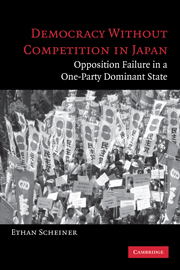Book contents
- Frontmatter
- Contents
- Tables and Figures
- Glossary of Abbreviations
- Acknowledgments and a Note on the Use of the Online Appendix
- Introduction: The Puzzle of Party Competition Failure in Japan
- 1 The Importance of Party Competition and a Model of Party Competition Failure
- 2 Opposition Failure in Japan: Background and Explanations
- 3 Clientelism and Its Determinants
- 4 The Impact of Clientelism and Centralized Government Financial Structure: Comparative Analysis
- 5 Local Opposition Failure in Japan
- 6 National-Level Opposition Failure: The Impact of Subnational-Level Weakness
- 7 Political Economy Changes and Their Impact on Party Systems: Comparative Analysis
- 8 Parallel Party Systems: Political Economy Changes and the Limits to Anti-Clientelist Appeals in Japan
- 9 The Problem of Organization and Coherence in Top-Down Party Formation
- 10 Conclusion: Democracy Without Competition
- References
- Index
7 - Political Economy Changes and Their Impact on Party Systems: Comparative Analysis
Published online by Cambridge University Press: 02 December 2009
- Frontmatter
- Contents
- Tables and Figures
- Glossary of Abbreviations
- Acknowledgments and a Note on the Use of the Online Appendix
- Introduction: The Puzzle of Party Competition Failure in Japan
- 1 The Importance of Party Competition and a Model of Party Competition Failure
- 2 Opposition Failure in Japan: Background and Explanations
- 3 Clientelism and Its Determinants
- 4 The Impact of Clientelism and Centralized Government Financial Structure: Comparative Analysis
- 5 Local Opposition Failure in Japan
- 6 National-Level Opposition Failure: The Impact of Subnational-Level Weakness
- 7 Political Economy Changes and Their Impact on Party Systems: Comparative Analysis
- 8 Parallel Party Systems: Political Economy Changes and the Limits to Anti-Clientelist Appeals in Japan
- 9 The Problem of Organization and Coherence in Top-Down Party Formation
- 10 Conclusion: Democracy Without Competition
- References
- Index
Summary
The combination of clientelism and centralization of governmental finances is not sufficient to explain opposition failure at the national level. New parties in three other Clientelist/Financially Centralized systems – Italy, Austria, and Mexico – developed into solid competitors in their respective party systems.
Mexico is different from the other Clientelist/Financially Centralized cases. Presidential systems such as Mexico's offer an opportunity for success to any party with a popular individual candidate. Moreover, it is difficult to find adequate comparisons in the other cases to the high levels of politically motivated violence inflicted upon many who supported the opposition in Mexico. There is also an important difference between Austria and the other cases. Austria's PR electoral system removes the importance of having strong candidates. For this reason, despite the limits placed on opposition parties' success at the local level, even non-ruling parties have an opportunity to do well at the national level if they put forth a sufficiently popular message (although, without a base of local office holders, non-ruling parties are hindered in many other ways). Nevertheless, for my model, the problem of the success of new parties in Italy remains. In Italy (as well as Austria), a powerful backlash against clientelism fueled new party growth and a solid challenge to the ruling regime (Kitschelt 1995a).
- Type
- Chapter
- Information
- Democracy without Competition in JapanOpposition Failure in a One-Party Dominant State, pp. 146 - 155Publisher: Cambridge University PressPrint publication year: 2005



